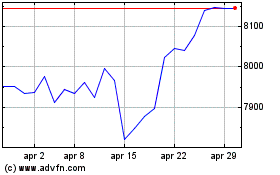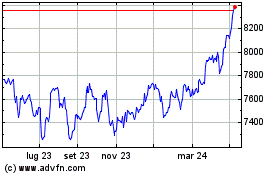MARKET WRAPS
Watch For:
U.K. unemployment; Germany CPI; trading updates from Ocado
Group, Experian, BMW, Vinci
Opening Call:
European shares look set to track lower at the open on Tuesday.
Asian stock benchmarks were lower; the dollar and Treasury yields
edged higher; oil futures were mixed and gold gained.
Equities:
Stock futures were tracking lower early Tuesday on a weak lead
from Asian equity markets.
Stock benchmarks in two of Asia's largest economies had climbed
to historic highs on Monday while U.S. equity and bond markets were
shut for Martin Luther King Day.
Fourth-quarter earnings season will pick up speed this week,
Goldman Sachs, Morgan Stanley, and PNC Financial Services are due
to file results on Tuesday.
This week, the main event on the economic front is likely to be
retail sales data on Wednesday, said Deutsche Bank strategist Jim
Reid.
After data last week showed slower-than-expected growth in
producer prices, investors have piled into bets that the Fed would
cut interest rates as soon as March.
Forex:
The U.S. dollar advanced in Asia amid geopolitical risks which
could spur safe-haven demand for the greenback.
The dollar is overvalued versus most G-10 currencies and risks
weakening if the Federal Reserve starts cutting rates, analysts at
BofA Global Research said.
"Fed cuts and risk appetite should pave the way for dollar
downside," the analysts said, and expect the dollar to depreciate
broadly, beyond the market's consensus by the year-end.
For now, BofA's proprietary flow data suggests that investors
are positioned roughly neutral on the dollar and short on emerging
market FX.
Bonds:
U.S. Treasury yields were broadly higher early Tuesday.
Bank bonds are expected to perform better than sovereign bonds
and non-financial bonds in 2024 as central banks start to cut
interest rates, Bank of America credit strategists Ioannis
Angelakis and Barnaby Martin said.
Central bank rate cuts are likely to result in fund inflows into
higher-yielding bank bonds, and outflows from sovereign bonds due
to falling yields, BofA said.
"In a lower yield environment bank spreads should outperform
non-financial spreads."
Energy:
Oil futures were mixed amid risk-off sentiment spurred partly by
losses in U.S. stock-index futures.
A softer tone across broader markets appears to offset
geopolitical risks and concerns of a U.S. cold snap lowering
production, UOB Global Economics & Markets Research said.
The current oil price doesn't reflect the contagion risk for oil
as well as Iran's well-demonstrated disruptive capabilities and
willingness to internationalize the costs of a confrontation, RBC
Capital Markets said.
"Iran remains the biggest wild card in this war, and should it
get directly involved in this conflict it could have a material
impact on the oil price," it said.
Metals:
Gold edged higher but may be weighed by higher Treasury yields
and a stronger dollar.
Higher U.S. bond yields are usually negative for the
non-interest-bearing precious metal, while the dollar typically has
an inverse correlation with gold.
The downside risks for gold are that Fed Gov. Christopher Waller
pushes back on market pricing for a March rate cut and shows a lack
of urgency to normalize policy, said Pepperstone.
Brookings Institution will host a discussion with Waller later
today.
--
Copper declined amid risk-off sentiment toward base metals, ANZ
Research analysts said.
Though copper traded near a one-month low after China's central
bank surprised the market on Monday by keeping its policy rate
unchanged, the analysts reckoned the move could ultimately bode
well for metals as it raises the chance of a cut to banks' reserve
requirement ratios next month.
A cut could boost financing for industrial activity, supporting
base-metal prices.
--
Iron-ore prices were lower amid concerns about China's economic
outlook as deflation risks persist.
Baosteel, China's largest steelmaker, has warned of sluggish
demand, ANZ Research analysts said.
Meanwhile, iron-ore inventory levels from Chinese steel mills
have increased more than 16% to 14.4 million tons in early January,
according to the China Iron and Steel Association.
Iron-ore prices will likely continue to be weighed down in the
absence of favorable policies, Nanhua Futures analysts said.
TODAY'S TOP HEADLINES
These Four Questions Are Top of Mind for Investors in 2024
The blockbuster stock market rally stalled once the calendar
flipped to 2024.
Some of the big tech stocks that drove the market's advance last
year appear to have run out of gas, government-bond yields have
risen and inflation might not be cooling as quickly as some
investors had hoped. After a rocky start to the month, the S&P
is clinging to a 0.3% advance in January.
ETFs Make Bitcoin's Problems Even Worse
The new wave of U.S. bitcoin ETFs risk being doubly bad for
investors.
As holders of bitcoin they undermine the very purpose, and so
the long-term value, of a cryptocurrency. And as ETFs launched at a
moment of popularity they might be repeating the mistake of many
past thematic funds by buying at a peak.
Fed Tiptoes Toward Dialing Back Key Channel of Monetary
Tightening
Though the Federal Reserve stopped raising interest rates last
summer, it is quietly tightening monetary policy through another
channel: shrinking its $7.7 trillion holdings of bonds and other
assets by around $80 billion a month.
Now that, too, may change. Fed officials are to start
deliberations on slowing, though not ending, that so-called
quantitative tightening as soon as their policy meeting this month.
It could have important implications for financial markets.
Three-quarters of chief economists expect 'weak' or 'very weak'
growth in Europe this year, Davos poll finds
A poll conducted of chief economists found three-quarters
expecting weak to very weak growth in Europe this year, the most
pessimistic outlook of any region.
The chief economist survey, released in conjunction with the
World Economic Forum in Davos but conducted in November and
December, found a big geographic split, with 93% expecting moderate
to strong growth in South Asia and 86% expecting that for East
Asia.
Rio Tinto Annual Iron Ore, Aluminum Output Rises
Rio Tinto on Tuesday said it produced more iron ore, aluminum
and copper last year than the year before, reaching annual targets
as it ramped up new mining operations in Australia and
Mongolia.
The world's second-biggest miner by market value said it
produced 331.5 million metric tons of iron ore at its network of
mines in Australia in 2023, up 2% versus 2022, and shipped 331.8
million tons, up 3%. Rio Tinto, a top exporter of the steel
ingredient, previously told investors it expected shipments in the
upper half of a 320-million to 335-million ton range.
Ukraine Says It Downed Russian Surveillance Plane
KYIV, Ukraine-Ukrainian forces are struggling to hold back
Russian troops on the ground, but they are proving adept at hitting
high-value Russian targets, with the downing of a surveillance
plane adding to string of recent blows to Moscow's air force.
Valeriy Zaluzhniy, the commander of the Ukrainian armed forces,
said Monday on Telegram that Ukraine's air force shot down an A-50
long-range radar detection aircraft, as well as a IL-22 bomber jet,
over the Sea of Azov. He offered no details about how the planes
had been brought down.
Israeli Military Near End of Most Intense Phase of Gaza
Fighting, Defense Minister Says
The Israeli military is close to completing its most intensive
phase of fighting against Hamas in the Gaza Strip, Israel's defense
minister said Monday, warning that the lack of a plan for postwar
Gaza could hurt the military campaign.
In northern Gaza, the most intensive phase of fighting is
complete, while the military is close to completing intense
fighting in the south, around the city of Khan Younis, Defense
Minister Yoav Gallant said Monday.
Apple to Remove Blood-Oxygen Sensor From Watch to Avoid U.S.
Ban
Apple is removing a blood-oxygen sensor from some of its
smartwatches to get around a patent dispute related to the
technology, a step likely to avoid further sales disruptions but
one that may raise questions about the company's push into
health.
The company halted sales of some watch models briefly last month
after a U.S. import ban went into effect stemming from an October
ruling by the U.S. International Trade Commission. The trade agency
found Apple had violated the patents of medical-technology company
Masimo related to the blood-oxygen tool. Sales resumed temporarily
in recent weeks pending a legal review.
Chip Wars Boost Europe's Top Tech Company-for Now
The more the U.S. government worries about China's ambitions in
the chip industry, the more equipment for making chips that China
seems to buy.
When ASML, the Dutch company that makes the world's most
advanced lithography machines for manufacturing microchips, reports
fourth-quarter results next week, one of the most eye-catching
numbers will be the share of sales it made in China. This reached
an extraordinary 46% in the third quarter, up from just 8% in the
first three months of the year.
Write to singaporeeditors@dowjones.com
Expected Major Events for Tuesday
07:00/NOR: Nov Monthly GDP
07:00/UK: Dec UK monthly unemployment figures
07:00/GER: Dec CPI
08:00/SVK: Nov New orders in industry
09:00/ITA: Dec CPI
10:00/CRO: Dec CPI
10:00/GER: Jan ZEW Indicator of Economic Sentiment
11:00/IRL: Dec CPI
All times in GMT. Powered by Onclusive and Dow Jones.
Write to us at newsletters@dowjones.com
We offer an enhanced version of this briefing that is optimized
for viewing on mobile devices and sent directly to your email
inbox. If you would like to sign up, please go to
https://newsplus.wsj.com/subscriptions.
This article is a text version of a Wall Street Journal
newsletter published earlier today.
(END) Dow Jones Newswires
January 16, 2024 00:15 ET (05:15 GMT)
Copyright (c) 2024 Dow Jones & Company, Inc.
Grafico Indice FTSE 100
Da Nov 2024 a Dic 2024

Grafico Indice FTSE 100
Da Dic 2023 a Dic 2024
